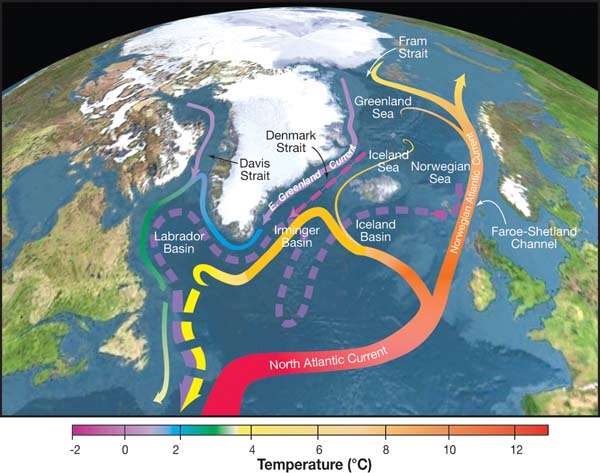Topographic map of the Nordic Seas and subpolar basins with schematic circulation of surface currents (solid curves) and deep currents (dashed curves) that form a portion of the Atlantic meridional overturning circulation. Colors of curves indicate approximate temperatures. Credit: R. Curry, Woods Hole Oceanographic Institution/Science/USGCRP.
(Phys.org)—The Earth's oceanic system isn't just the big, blue puddle of water that globes suggest; its waters are stirred by a vast system called thermohaline circulation, a process driven by varying water densities, heat, and the interactions of freshwater and salt water. Thermohaline circulation moves energy and matter around the globe and drives the planet's climate, but it also responds to changing climate conditions.
For example, one such oceanic conveyor is the Atlantic Meridional Overturning Circulation (AMOC-IV), which drives warm water poleward from the equator, cooling toward the North, and sinking as it becomes more dense at high latitudes. This cold, dense water then empties into ocean basins before upwelling in in the Antarctic.
Its interdecadal variability, measured by the oscillation of its period and amplitude, modulates climate changes worldwide. However, it's unclear how global warming affects AMOC-IV, and an international collaborative of researchers has now investigated the effects of climate change on AMOC-IV amplitude and time scale.
The researchers conducted an analysis of 19 experiments from five models of the Coupled Model Intercomparison Project Phase 5 simulations; each experiment had one preindustrial control simulation and four future warming scenarios. Under all future global warming scenarios, AMOC transport is reduced by 5 percent to 48 percent, depending on the scenario. "In response to future global warming, AMOC-IV shows a robust change, with its major period shortened and its amplitude reduced," the authors write.
They note that the reduced amplitude of AMOC is consistent with other modeling studies. The mechanism of its changes under global warming remains unclear, however, due to the challenging complexities and interactions of global oceanic circulation. As one candidate for such a mechanism, they cite baroclinic Rossby waves. These are huge, slow waves in the troposphere generated by temperature differences of the oceans and continents.
"With global warming, oceanic stratification is projected to be enhanced over the globe owing to a weaker warming with depth, and the stratification enhancement is more robust in a stronger warming scenario," they write. "A stronger stratification should lead to faster baroclinic Rossby waves and, potentially, a shorter period of AMOC-IV."
Even continental regions situated far from the coasts are strongly influenced by ocean currents. Since most of the sun's radiation is absorbed by the ocean, the movement of this energy in the Gulf Stream and other currents serves to modulate weather; through evaporation, heat from the ocean is exchanged with the air. A failure of the conveyance of heat away from warm regions and toward cooler regions stands to throw the climate further out of balance. Thus, research into climate change-related disruptions of oceanic conveyors is important as CO2 and methane contribute to atmospheric heat retention.
The authors conclude, "Our study suggests that AMOC-IV may be significantly weakened in amplitude and shortened in period under future global warming, and that these responses could be caused by strengthened ocean stratification and, in turn, the speedup of baroclinic Rossby waves."
More information: Reduced interdecadal variability of Atlantic Meridional Overturning Circulation under global warming. PNAS 2016 ; published ahead of print March 7, 2016, DOI: 10.1073/pnas.1519827113
Abstract
Interdecadal variability of the Atlantic Meridional Overturning Circulation (AMOC-IV) plays an important role in climate variation and has significant societal impacts. Past climate reconstruction indicates that AMOC-IV has likely undergone significant changes. Despite some previous studies, responses of AMOC-IV to global warming remain unclear, in particular regarding its amplitude and time scale. In this study, we analyze the responses of AMOC-IV under various scenarios of future global warming in multiple models and find that AMOC-IV becomes weaker and shorter with enhanced global warming. From the present climate condition to the strongest future warming scenario, on average, the major period of AMOC-IV is shortened from ∼50 y to ∼20 y, and the amplitude is reduced by ∼60%. These reductions in period and amplitude of AMOC-IV are suggested to be associated with increased oceanic stratification under global warming and, in turn, the speedup of oceanic baroclinic Rossby waves.
Journal information: Proceedings of the National Academy of Sciences
© 2016 Phys.org




















